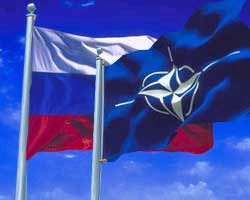Can NATO and Russia get over the Cold War?
 Brussels - The Cold War is over, but one would not know it 20 years on based on the mutual mistrust that still characterizes relations between Moscow and the West.
Brussels - The Cold War is over, but one would not know it 20 years on based on the mutual mistrust that still characterizes relations between Moscow and the West.
After the fall of the Berlin Wall, "NATO and Russia developed rather unrealistic expectations about each other - and those flawed expectations (...) continue to burden our relationship," NATO Secretary General Anders Fogh Rasmussen said in his first major policy speech on September 18.
NATO and the Kremlin are now trying to be nice to each other. Whether the hatchet will ever be buried for good remains to be seen.
For half a century after the end of World War II, Europe was the ideological battleground of the world's two superpowers.
The Soviet Union (USSR) swallowed the Baltic states and imposed puppet governments on the countries of the Warsaw Pact in a bid to stop the West "strangling the Socialist infant in its cradle" - to quote the propaganda of the time.
The United States, in reply, offered capitalist states the protection of NATO, spreading its aegis progressively over Europe to take in Greece and Turkey (1952) and West Germany (1955), in what Moscow saw as an attempt at encirclement.
The end of the Cold War and the collapse of the USSR saw NATO membership being extended to much of Central and Eastern Europe. Many observers expected the ideological clash between Moscow and Washington to melt away.
Russia has "no ideological conflict" with the West, and therefore there should be no tension, Vladimir Putin, Russia's former president and current premier, has repeatedly said in recent years.
Yet officials on both sides say that, in terms of diplomatic relations, it is almost as if the Cold War had never ended.
"Put simply, Russia expected NATO to be dissolved when the Warsaw Pact collapsed. Because it didn't, many in Russia can only find one explanation - that the Alliance still sees Russia as a threat," Rasmussen said.
By the same token, the West was "unrealistic" to hope that Russia would accept NATO's self-appointed role as the best guarantee for peace and security in Europe, and now feels "disappointment and incomprehension" when Russia opposes it, he said.
Those feelings came to a head in Georgia in the summer of 2008, after NATO leaders promised that the Caucasus state would join the alliance at an unspecified future point.
That pledge, and a similar one for Ukraine, provoked outrage in Moscow, where it was seen as a new attempt to "encircle" Russia with a string of US bases.
Russia's August 2008 invasion of Georgia and its row over gas supplies with Ukraine in January 2009 provoked equal fury in the West, where its actions were denounced as attempts to build a "sphere of influence" in Europe.
Both accusations could have come straight from the iciest days of the Cold War, as Rasmussen was quick to admit.
"Our relationship went into a freeze - because the foundations of this relationship were not strong enough," he said.
Rasmussen's proposed solution to the problem is to build confidence between the two sides by cooperating on issues of mutual concern, such as the fight against terrorism and the stabilization of Afghanistan.
That idea, at least, won guarded plaudits from Russian commentators, although officials in Moscow stressed that it was up to NATO to put those positive words into action.
But Rasmussen's insistence that NATO will continue to expand its membership no matter what Russia says all but guarantees more clashes to come, after Russia's recent national security review labelled NATO expansion the biggest threat to the relationship.
And, with the euphoria of the fall of Communism long confined to the annals of history, leaders on both sides are now admitting that, far from putting the Cold War tensions behind them, their best hope is to try and keep them on the sidelines while the real work is done.
"Our ultimate goal must be a relationship that allows us to pursue common interests even when we disagree in other areas," Rasmussen said. (dpa)